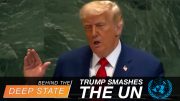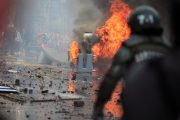The question of whether the United States should have intervened in Libya by sending in troops to fight against the troops of Libyan ruler Muammar Gaddafi has divided the Republican Party, with constitutionalists and realists opposing intervention in Libya, and internationalist-minded neoconservatives supporting intervention in Libya.
Most GOP Presidential hopefuls have declared their support for Libyan intervention, and have only differentiated themselves from (Democratic) President Barack Obama in that they oppose the exact mechanisms by which the United States is intervening in Libya. Most Republican Presidential candidates are not concerned with the Constitution and the warnings of the Founding Fathers against intrusion in the internal affairs of foreign countries, but instead are concerned with the fact that our intervention is multilateral, as opposed to unilateral, and say that they would support Obama if he didn’t place American troops in a conflict in which the approval of NATO and the U.N. was sought.
The potential candidates toeing a thin line between support for the military action and criticism of President Obama. One notable exception is Mississippi Gov. Haley Barbour, who has declined to criticize Obama’s handling of the crisis
Former Speaker of the House Newt Gingrich (pictured above) has failed to articulate a cohesive opinion and essentially flip-flopped on the issue of American involvement in Libya. On the Today Show Wednesday morning, Gingrich blasted the intervention:
It is impossible to make sense of the standard for intervention in Libya except opportunism and news media publicity. The standard [Obama] has fallen back to of humanitarian intervention could apply to Sudan, to North Korea, to Zimbabwe, to Syria this week, to Yemen, to Bahrain. … The Arab League wanted us to do something. The minute we did something, the Arab League began criticizing us doing it. I think that two wars in Iraq and Afghanistan is a lot. I think that the problems we have in Pakistan, Egypt — go around the region. We could get engaged by this standard in all sorts of places. I would not have intervened. I think there were a lot of other ways to affect Qaddafi. I think there are a lot of other allies in the region we could have worked with. I would not have used American and European forces.
Yet earlier this month, Gingrich blasted Obama on Fox News, saying that if he were president, he would unilaterally "exercise a no-fly zone this evening," on the grounds that "we think that slaughtering your own citizens is unacceptable." He has since attempted to address the discrepancy in a Facebook post:
From the moment of the president’s declaration, he put the prestige and authority of the United States on the line. After March 3, anything short of a successful, public campaign for regime change would have been seen as a defeat for the United States.
That’s why during a March 7th Greta van Susteren interview, I asserted that the president should establish a no-fly zone "this evening.” After March 3rd, the President should have moved immediately to consult with Congress to implement a no-fly zone, while also making it clear the US would welcome involvement from other nations.
Instead, he did the opposite. The President wasted weeks trying to get approval from the United Nations instead of Congress, the result of which was a weak mandate from the UN that changed the mission to one of humanitarian intervention.
Yet, by that standard we should also be using US forces in the Sudan, Syria, Zimbabwe, Yemen and more countries.
Given the President's public statements and the multitude of other humanitarian crises throughout the world, the only rational purpose for an intervention with US forces in Libya is to replace Gadaffi.
Now that we have US forces engaged, any result less than the removal of Gadaffi from power will be considered a defeat.
For that reason, I believe we must support the mission and see it through.
Former Massachusetts Governor Mitt Romney said on the Hugh Hewitt Show Monday that he supports military action in Libya, but criticized the administration's multilateral approach, deferring to European allies and the Arab League before ultimately deciding to use force. Romney also said that he believes Obama should have intervened earlier, but he hasn’t said explicitly that he would have moved unilaterally with military action or what that would have involved.
He said, “In the President’s world, all nations have common interests, the lines between good an evil are blurred, America’s history merits apology. And without a compass to guide him in our increasingly turbulent world, he’s tentative, indecisive, timid and nuanced.”
"I support military action in Libya. I support our troops there and the mission that they’ve been given. But let me also note that thus far, the President has been unable to construct a foreign policy, any foreign policy," Romney said. "And I believe that it flows from his fundamental disbelief in American exceptionalism."
He then referred back to the Lockerbie bombing, not the rebel uprising, as the apparent justification for getting rid of Gaddafi. He suggested he would have moved unilaterally but did not say so explicitly. Nor did he outline the steps that should be followed now to oust the Libyan dictator. Aides said his comments spoke for themselves.
“And as a result, I think, he says, for instance, he’s committed to our success in Afghanistan unless it means commitment beyond 2011. He stands with our ally, Israel, but condemns its settlement policy even more forcefully than he condemns Hamas’ rockets. And he calls for the removal of Muammar Gaddafi, but then conditions our action on the directions we get from the Arab League and the United Nations.”
Romney also said that he believes that due to Obama's perceived indecisiveness and multilateralism on the issue of Libya, the world perceives Obama and the United States as being weak:
I think one of the comments I’ve heard from individuals abroad is that in the past, America has been feared sometimes, has been respected, but today, that America is seen as being weak. We’re following the French into Libya. I appreciate the fact that others are participating in this effort, but I think we look to America to be the leader of the world. You know, the cause of liberty can endure the mistakes that are inevitable consequences of human fallibility. But liberty’s standard can’t prevail if it’s not proudly, decisively and consistently held aloft.
Related articles:
Libya Costs Will Undermine GOP Savings
Paul, Kucinich Seek to Defund “Impeachable” War on Libya
Democrat Calls Obama’s Actions in Libya “Impeachable”
Obama, Clinton, and Biden Agree: War on Libya Is Unconstitutional
UN Trumps Constitution, Congress in President’s Undeclared War on Libya
Rep. Amash Calls Libya Action Unconstitutional
A Real Cost/Benefit Analysis of Libyan Intervention
On Libya, It's the Beltway Interventionists vs. Ron Paul and the Founders




